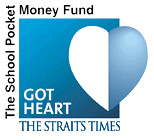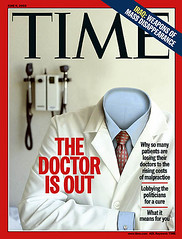... there's no such thing as a free lunch.
Surprise request makes senior citizens' blood boil
FREE checkup, but there's a BLOOD 'FEE'?
By Maureen Koh
December 13, 2005
THEY had fasted for 10 hours - no food, only water - to prepare for a health-screening the following morning.
Three of them, all aged above 55, woke up as early as 7.30am to make their way from their Bedok homes to the community club at Joo Chiat where the screening would start at 9am.
All for what the publicity banners had promised: Free health-screening.
It was to be a public service to senior citizens above 55 years old.
But to their surprise, they claimed they soon learnt that this 'free' service came with a condition:
Some elderly participants said they were told they had to sign a consent form to agree to take part in a study.
For this, they each had to give 20ml of their blood, of which 5ml would be for the health-screening and 10ml to be used for research purposes.
The remaining 5ml would be stored up to five years for future related studies.
'TURNED AWAY'
It might not have been much, but it was enough to turn some people away.
One of them was Madam J Wan, 63.
The housewife, a diabetic and former stroke patient, said in English: 'I explained that even I had difficulty drawing blood for my own home-tests, and that I was not prepared to donate my blood.'
She claimed she was then told by one of the nurses who had attended to her: No signature on the approval form, no free health-screening.
Said Madam Wan: 'How can they say this? In the first place, it was not stated anywhere (on the banner) nor was it properly told to us that there were conditions attached.'
The Department of Psychological Medicine of the National University of Singapore, which is conducting the research, however, said it was a miscommunication.
But another participant, who wanted to be known only as Mr Tang, 59, agreed with Madam Wan.
NOT CLEAR
He said in Mandarin: 'I think they should make it very clear. I mean, it is quite ridiculous to expect us to fast, make our way there and then be turned away because we do not agree to them taking 'extra' blood.'
Those who refused were allegedly given back their identity cards and told that they could go home.
Mr Tang signed the form. He said: 'What do you expect me to do? Go home? I don't have a job, so if I can save some money, why not?
'People will probably call us 'cheapskates', but when you are poor, every cent saved means something.
Anyway, you can see it this way - I did not get it for free. I paid for it with my blood,' he said.
For cleaner Leong A J, 65, it was more a matter of principle.
She said in Mandarin: 'To me, they are not different from sales people who claim they are giving away free things, then later tell you that you have to spend a certain sum of money first.'
The episode did not end there for her.
According to her, someone called her later in the day and wanted to find out why she had not agreed and if she minded going back again.
Said an annoyed Madam Leong: 'After I had wasted four hours of my time, I still had to put up with this.
'It was not even because they just wanted feedback - but they were more concerned that they had lost a potential 'donor'!'
Mrs Lim, 64, a nanny, also claimed she received such a call.
Some of the elderly citizens also alleged that none of the personnel there could tell them what the research was for.
Delivery man Ishak, 58, said in a mix of Malay and English: 'I asked the woman what's the name of the research, and she was unable to answer. She just muttered, 'Some research, lah.'
'That is really so strange. How do you expect us to trust them if the answers were not forthcoming?' he said.
Madam Wan said that the way she was 'dismissed' was a case of adding insult to injury.
She alleged: 'One of the women who returned my identity card commented, 'Anyway, you are not from Joo Chiat!' '
HUMILIATION
According to the Patient Information Sheet and Informed Consent Form that the participants received, residents living in all areas covered by the South East Community Development Council (which comprises Geylang Eunos, Aljunied, MacPherson, Bedok and Marine Parade) are eligible.
Madam Wan said: 'We may have gone for something free, but that does not mean that we should be treated this way.'
Madam Winnie Foo, 56, a school administrative assistant, said the publicity materials should have clearly stated the conditions.
She said: 'When they do that, we can make our own decisions.
'To the healthy, an extra 5ml of blood may mean nothing, but some elderly folk may have reservations.
'I guess, as the saying goes: There's no free lunch.'
Misunderstanding, says don
IT was impossible to list all the details of the free health-screening on banners displayed in the neighbourhood.
So said Associate Professor Ng Tze Pin, director of the Gerontology Research Programme, from the Department of Psychological Medicine at NUS.
'There was no way anyone can put all that information on the banners,' he told The New Paper.
'It was just a case of miscommunication.'
The health-screening was part of the Singapore Longitudinal Aging Study, a medical research aimed at increasing the understanding of ageing and health among elderly Singaporeans.
POPULAR
Prof Ng confirmed that 20ml of blood was to be taken from all participants, of which 15ml would be used initially for the health-screening and the study.
Another 5ml would be kept for future related research.
But Prof Ng insisted that it was not his team's intention to turn away people even if they declined to donate blood.
He said: 'These allegations are not true.
'Our programme is very popular with many people and we have many subjects who sign up.
'Of course, there are those who would refuse and they cite health reasons like they are anaemic, have low blood pressure or that they may feel faint.
'We will still accept them.
'There may be unique cases where the subjects decide against participating altogether.'
Figures given to The New Paper showed that since the programme started in September 2003, there have been 2,728 participants.
Of these, 17 were enrolled into the programme even though they declined to donate their blood.
TROUBLESOME
At the Joo Chiat Community Club, where the team has been operating since 19 Sep this year, 585 participants have signed up for the study.
Prof Ng stressed that staff members have been reminded to explain the details fully.
'They have been told to handle the subjects carefully and patiently.
'We always tell our staff that these are old people.
'They are not educated and can be troublesome, which is expected because of their age.'
However, he added: 'While we do our best to explain the details, can they understand them fully?
'Even if you tried to do so, can you guarantee that they can understand you? We can only do our best.'
Well, not enough information for me to tell who's wrong or right, but certainly proves once again that there is no such thing as a free lunch... or 'free' health screening.
Labels: in the news










